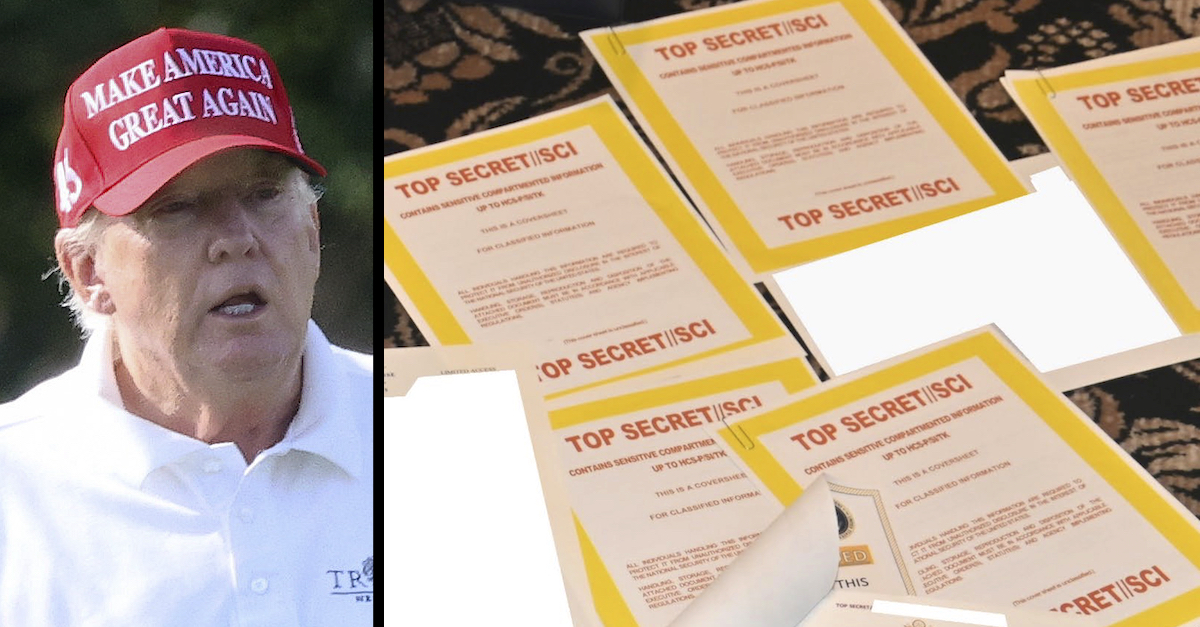
Former U.S. President Donald Trump was seen golfing on Sept. 13, 2022.
Federal prosecutors filed a photo of documents recovered from Mar-a-Lago in early August 2022. (Photo of Trump by Win McNamee/Getty Images; photo of Mar-a-Lago documents via a federal court filing.)
The Department of Justice asked to fast-track an appeal challenging the order appointing a special master to review thousands of files seized from Mar-a-Lago, emphasizing that they want to resume their criminal investigation involving former President Donald Trump “without restraints.”
“Based on the district court’s orders thus far, the government is barred from accessing all of the materials except those with classification markings recovered in August pursuant to a lawful search warrant and it may continue to be barred from doing so until mid-December or later,” the government noted in a 15-page motion filed on Friday evening.
The 11th Circuit Court of Appeals already allowed the government to resume using the more than 100 documents with classification markings that they seized from Mar-a-Lago for their ongoing Espionage Act investigation. The appellate order blocked part of an injunction from U.S. District Judge Aileen Cannon, a Trump appointee.
However, investigators still cannot access the more than 11,000 other documents — totaling more than 200,000 pages — without classification markings because the government narrowly tailored their request for a stay.
“To be sure, the government sought a partial stay of the district court’s September 5 order only as it pertained to records bearing classification markings because those aspects of the order caused the most serious and immediate harm to the government and the public,” the filing noted. “And the motions panel agreed that the injunction against the government’s review and use of those records for criminal investigative purposes ‘risks imposing real and significant harm on the United States and the public.'”
Still, the Justice Department emphasized that the remaining constraints still impede their investigation.
“Even if not to the same degree, such harms persist with respect to the district court’s injunction against the government’s review and use of thousands of remaining documents and other materials that were recovered pursuant to a court-authorized search and may constitute evidence of crimes,” the motion states. “The government is thus unable to examine records that were commingled with materials bearing classification markings, including records that may shed light on, for example, how the materials bearing classification markings were transferred to Plaintiff’s residence, how they were stored, and who may have accessed them.”
These limitations, the government says, have hindered their investigation into possible obstruction of justice and concealment and removal of government records.
“In short, an expedited schedule for briefing and argument may enable the government, if it is successful in this appeal, to more quickly resume its full investigation without restraints on its review and use of evidence seized pursuant to a lawful search warrant,” the motion states.
In making their request, the Justice Department pointedly cited Judge Cannon’s “sua sponte” rulings favoring Trump — that is to say, orders that neither party formally requested. Cannon recently extended deadlines further delaying the completion of the review and overruled Senior U.S. District Judge Raymond Dearie’s order that Trump’s lawyers lodge any disputes over the authenticity of the seized documents on the public record.
The order, made by Trump’s pick for special master, would have forced the former president to prove suggestions he made on Fox News that the FBI may have planted the documents.
Legal experts have noted that it’s rare for a district judge to micromanage the work of an appointed special master.
“I believe that the Department of Justice has had just about enough of the farce that Judge Canon has created, having read her order essentially overruling the special master’s theory on virtually every point,” opined former federal prosecutor Mitchell Epner, now a partner at Rottenberg Lipman Rich P.C. “And they have decided that rather than live through the annoyance of going through the special master proceedings, they’re going to seek to have the curtain brought down on it by the 11th Circuit long before Judge Cannon can issue her next destructive order.”
The government makes a point to note that, if the special master review is allowed to proceed, Trump’s legal team will be able to challenge any of Dearie’s determinations at every turn.
“Absent such resolution by this Court, the special master proceedings could result in prolonged litigation, including through seriatim appeals to the district court from reports and recommendations and other rulings issued by the special master,” the motion states.
The government’s proposed schedule would see the appeal fully briefed by Nov. 11 and requests the “first available calendar” date for arguments after that point.
Read the motion, below: